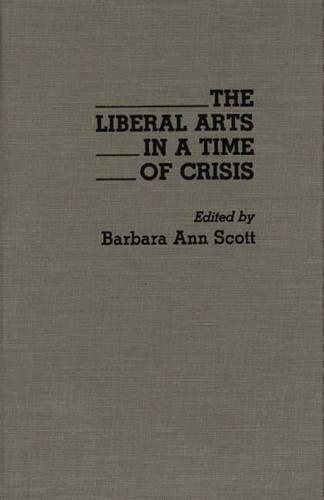
The Liberal Arts in a Time of Crisis
(Hardback)
Publishing Details
The Liberal Arts in a Time of Crisis
By (Author) Barbara A. Scott
Bloomsbury Publishing PLC
Praeger Publishers Inc
30th September 1991
United States
Classifications
Tertiary Education
Non Fiction
378.73
Physical Properties
Hardback
256
Description
This volume is a timely and provocative analysis of the crisis provoked by the devaluation of the liberal arts and sciences in colleges and universities in the United States, which has accompanied the growing popularity of practical and professional programs of study. This technicization of higher education's curriculum has also coincided with declining academic standards and a growing crisis of literacy among today's students. The new emphasis on developing useful knowledge and marketable skills, the book contends, has been at the expense of nurturing critically aware and intellectually able citizens through an education enriched by the liberal arts. The editors of this book have assembled a distinguished roster of academicians who provide illuminating critical commentary on these interwined issues and wide-ranging alternatives for recovery of higher learning. The first part of The Liberal Arts in a Time of Crisis explores the politics and ideology underscoring the development of curricular policies and pedagogical trends in colleges today. Some of the fallout of these new policies has been rampant anti-intellectualism among students and increasingly narrow and esoteric research specialization among faculty. In the concluding sections, contributors examine the shortcomings of the literacy crusade currently being organized by the educational establishment and provide workable guidelines for refocusing the curriculum and revitalizing the learning process. All those concerned with these issues will find this book invaluable.
Reviews
The essays, written in the vein of "critical theory," deal with liberal learning and the role of liberal arts in education. Part 1 describes a crisis in culture and higher education, primarily because of depoliticizing education and an emphasis on a "new practicality." Part 2 suggests that a reconceived liberal arts study holds the best promise for liberating critical thought and stimulating democratic action. These are old fashioned, but still pertinent, virtues. Several of the essays contain good, common sense in matters where it is least seen today: that the experience of minority cultures can be embodied in literature, the arts, and philosophy; that past liberal education has not guaranteed amelioration of women's social status and self-esteem; that foreign languages should be studied for their intrinsic valuead that egalitarian innovations often are misguided because they confuse individual academic performance with overall worth as a person. Barbara Scott, author of Crisis Management in American Higher Education (1983), summarizes and introduces the essays at the beginning of each part, showing that they are very much worthwhile reading. Recommended for undergraduate and graduate students.-Choice
"The essays, written in the vein of "critical theory," deal with liberal learning and the role of liberal arts in education. Part 1 describes a crisis in culture and higher education, primarily because of depoliticizing education and an emphasis on a "new practicality." Part 2 suggests that a reconceived liberal arts study holds the best promise for liberating critical thought and stimulating democratic action. These are old fashioned, but still pertinent, virtues. Several of the essays contain good, common sense in matters where it is least seen today: that the experience of minority cultures can be embodied in literature, the arts, and philosophy; that past liberal education has not guaranteed amelioration of women's social status and self-esteem; that foreign languages should be studied for their intrinsic valuead that egalitarian innovations often are misguided because they confuse individual academic performance with overall worth as a person. Barbara Scott, author of Crisis Management in American Higher Education (1983), summarizes and introduces the essays at the beginning of each part, showing that they are very much worthwhile reading. Recommended for undergraduate and graduate students."-Choice
Author Bio
BARBARA ANN SCOTT is Associate Professor with the State University of New York.
